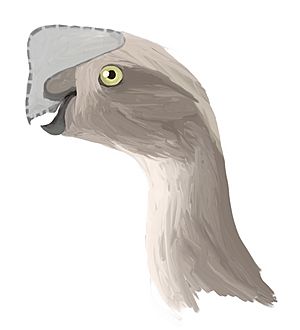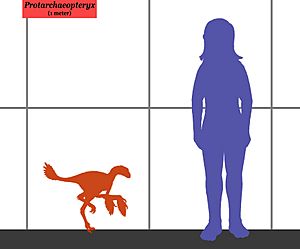Protarchaeopteryx facts for kids
Quick facts for kids ProtarchaeopteryxTemporal range: Lower Cretaceous
|
|
|---|---|
 |
|
| Conservation status | |
|
Fossil
|
|
| Scientific classification | |
| Kingdom: | |
| Phylum: | |
| Class: | |
| Superorder: | |
| Order: | |
| Suborder: | |
| Infraorder: | |
| Genus: |
Protarchaeopteryx
|
| Species: |
P. robusta
|
| Binomial name | |
| Protarchaeopteryx robusta Q. Ji and S. Ji, 1997
|
|
Protarchaeopteryx (say "Pro-tar-kee-OP-ter-iks") was a cool feathered dinosaur that lived in China. Its name means "before Archaeopteryx" because it was found earlier in the fossil record. This dinosaur was about the size of a turkey.
It lived around 124.6 million years ago. This was during the early Cretaceous time. Scientists found its fossils in a place called the Yixian Formation. Protarchaeopteryx likely ate plants (it was an herbivore) or a mix of plants and meat (an omnivore). Even though it might have eaten plants, its hands looked a lot like those of small meat-eating dinosaurs.
Scientists think Protarchaeopteryx was one of the earliest members of a group called Oviraptorosauria. It might even be closely related to, or the same as, another dinosaur called Incisivosaurus.
What Protarchaeopteryx Looked Like
The only known fossil of Protarchaeopteryx is a partial skeleton. This special fossil is called the holotype.
Protarchaeopteryx had long legs, which means it could probably run very fast. It had feathers on its body, including a short tail with well-developed feathers. Its hands were long and thin. Each hand had three fingers with sharp, curved claws.
This dinosaur's bones were hollow, just like bird bones. It also had a wishbone, which is a bone found in birds. Protarchaeopteryx was about 1 meter (3 feet) long. This made it bigger than Archaeopteryx.
Did Protarchaeopteryx Fly?
Protarchaeopteryx had feathers on its tail that were symmetrical. This means both sides of each feather were the same shape. Today, birds with symmetrical feathers usually cannot fly. Also, the bones of Protarchaeopteryx were not strong enough for it to flap its wings and fly. So, scientists believe it was a dinosaur that could not fly.
Some experts think it might have lived in trees. It could have jumped from branches and used its feathered forelimbs to glide or parachute down.
Images for kids
See also
 In Spanish: Protarchaeopteryx robusta para niños
In Spanish: Protarchaeopteryx robusta para niños
 | Emma Amos |
 | Edward Mitchell Bannister |
 | Larry D. Alexander |
 | Ernie Barnes |



